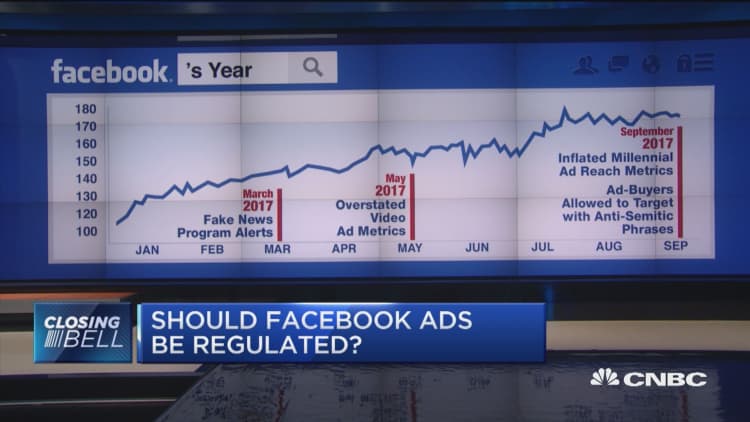
Facebook CEO Mark Zuckerberg has said the scope of the opioid crisis was what surprised him most during his 2017 travels throughout the country.
But all he had to do was look at Facebook to see how pervasive the marketing is for these powerful and addictive pain medications.
Sellers here and overseas are using Facebook pages and videos to offer drugs that U.S. laws say require a prescription, CNBC has found.
Searching on Facebook for the names of some of the most commonly prescribed pain medications pointed to multiple vendors selling Oxycodone, Hydrocodone, Percocet and other similar drugs.
This illicit marketing persists three months after NBC News highlighted the problem, and weeks after President Donald Trump declared opioid addiction a public health emergency.

The following screen shots show how sellers are using both Facebook videos and text posts to market these drugs illegally.
This content is not hard to find as long as you know what you're looking for.
For example, if you type in the name of various opiates followed by the phrase "for sell," you can find information that won't be revealed by typing in "for sale" instead.
Here's a post we found on November 13 with a Facebook search for "roxycodone,hydrocodone,oxycodone pills for sell."
These posts can evade detection on Facebook for months. For example, we conducted a search on November 13 for "Oxycodone 30 mg for sell." The results included a Facebook post dated Sept. 9, which was still online.
When CNBC notified Facebook of these posts, the company said it would remove them. However, 12 hours later many similar posts were still available. The company told CNBC:
Anyone can report content to us if they think it violates our standards. People can flag Pages, profiles, individual content, and/or comments to us for review.
Upon receiving these reports, our Community Operations team, which is global and reviews content 24/7 in over 40 different languages, reviews reports against our Community Standards to determine if they violate. We remove violating content as soon as we become aware of it.
In this case, a number of the Pages that turn up based on the search terms you provided were in violation of our policies. They have been removed from the platform.
This statement suggests that Facebook is currently relying on users to police the site for illegal drug sales, rather than devoting employees to this task. Facebook did not immediately respond to a question whether it has specific employees to look for illegal drug listings on its site.
However, Facebook said on its last earnings call it will hire up to 20,000 people in 2018 for "safety and security," including policing the site for fake news and other prohibited content.
Facebook is not alone in providing unwitting marketing space for opioids. For example, a similarly simple search found videos advertising opioids on YouTube, a unit of Facebook-rival Alphabet.
For instance, this video selling Oxycodone was uploaded to YouTube six months ago and still showed up on Nov. 13.
It was just one of several opiate marketing videos found by typing in search phrases like "oxycodone for sell" or "fentanyl for sell."
A YouTube spokesperson told CNBC:
YouTube's Community Guidelines prohibit any content encouraging dangerous or illegal activities, this includes content promoting the sale of drugs. We routinely remove videos and comments flagged by our community that violate those policies and in many cases we terminate the accounts of users who violate our Guidelines.
Several hours after CNBC sent YouTube the first video listed above, it still appeared on the site. And, in a fitting bit of irony, the YouTube search algorithm was so good that after this reporter typed in dozens of different strings in the course of researching this story, the search box started suggesting different pill doses and vendors selling similar drugs.
In both cases, it appears these companies are playing a game of "whack a mole" when it comes to illegal drug marketing, taking content down after discovering it, rather than effectively stopping that content from being posted in the first place.
The inability of these giant Internet companies to keep illegal drug sellers off their sites shows that it's not just fake news, hate speech, violent videos and foreign political propaganda that are overwhelming their content-filtering systems.
WATCH: The opioid crisis brings new risk to real estate agents



